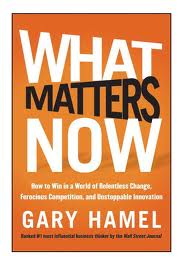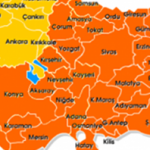The Management Tax: Unnecessary overhead or genuine value-add?
 Gary Hamel’s book “What matters now: How to Win in a World of Relentless Change, Ferocious Competition, and Unstoppable Innovation” is a good read.
Gary Hamel’s book “What matters now: How to Win in a World of Relentless Change, Ferocious Competition, and Unstoppable Innovation” is a good read.
I don’t think his viewpoints are particularly new or ground breaking, but he certainly hits on a couple of key issues troubling today’s enterprises and our capitalistic community models.
Hamel discusses the shortcomings of how we have executed our businesses within the capitalistic framework lately. We all know there is a lot to be embarrassed about. The recession caused by a collapse in the financial industry was driven by greedy and shortsighted executives. The current application of the capitalistic system is not capable of securing jobs for everyone and cannot distribute wealth to the benefit of more people. There is definitely room for improvement. Where is this improvement going to come from?
“If you are a leader at any level in any organization, your are a steward – of careers, capabilities, resources, the environment, and organizational values. Unfortunately, not every manager is a wise steward. Some behave like mercenaries – by mortgaging the future to inflate short-term earnings, by putting career ahaed of company, by exploiting vulnerable employees, by preying on customer ignorance, or by manipulating the political system in ways that reduce competition. What matters now, more than ever, is that managers embrace the responsibilities of stewardship.”
The Ethical Perspective
 Hamel calls for some sincere and frank introspection and self appraisal in the executive ranks. Positions of power shouldn’t be used for self-serving purposes only. Those who have the “ability” also carry the “responsibility” to contribute to the common wellbeing of our societies and help make the world a better place for everybody. Being “successful” and rich doesn’t deserve respect unless you also go the extra mile and invest your genius in the service of improving the overall living conditions for mankind.
Hamel calls for some sincere and frank introspection and self appraisal in the executive ranks. Positions of power shouldn’t be used for self-serving purposes only. Those who have the “ability” also carry the “responsibility” to contribute to the common wellbeing of our societies and help make the world a better place for everybody. Being “successful” and rich doesn’t deserve respect unless you also go the extra mile and invest your genius in the service of improving the overall living conditions for mankind.
But it goes much further. Anyone with “power” (and most of us have “power” in various contexts) needs to carefully consider the balance between pursuing reckless self-interest and caring for other people and society. If we do not all find that balance and continue to ignore the external and negative impact of our actions, we will slowly but surely kill capitalism. Someday the neglected masses will start following their own narrow self-interest, and that will not be a pretty sight.
Management = Control
Management is expensive. Management accounts for 10-20% of total cost in most companies. When management is applied to control rather than stimulate people it becomes downright counter productive. It hampers agility, innovation and development.
Hamel argues that releasing the genius of the entire organization is required to move fast enough to keep our organizations competitive and win market shares, create completely new markets (blue oceans) or invent new business models. Believing that the executive office and a few handpicked men can handle business development and innovation is an example of the dangerous arrogance characterizing the majority of contemporary executive and management cohorts.
Yes, we can
Hamel includes two case stories of companies who are successful at applying a “management free” business model: Gore & Associates, makers of the textiles for ski jackets and outdoor apparel and Morning Star, a tomato processing company in California.
The case stories are excellent. They show that it is possible to build “management free” companies, but they also explain the challenges associated with making them work. It takes time for people to adapt to the new “rules”, but it seems that most of those who work for “management free” organizations don’t want to return to the old systems again.
 Our own company, TBK Consult Holding ApS, could have been used as a case story as well. We are a “management free” business development (consulting) company. The first and most visible benefit of being “management free” is the lower contribution we have to make to the company. Compared to the traditional consulting company each of us keeps at least 20-40% more to ourselves. No one at TBK Consult is paid a salary. Consultants share the revenue from the projects they work on. Those consultants who cannot sell projects live at the mercy of the other consultants. All staff, administrative and marketing tasks are paid for on a contract basis.
Our own company, TBK Consult Holding ApS, could have been used as a case story as well. We are a “management free” business development (consulting) company. The first and most visible benefit of being “management free” is the lower contribution we have to make to the company. Compared to the traditional consulting company each of us keeps at least 20-40% more to ourselves. No one at TBK Consult is paid a salary. Consultants share the revenue from the projects they work on. Those consultants who cannot sell projects live at the mercy of the other consultants. All staff, administrative and marketing tasks are paid for on a contract basis.
A company like TBK Consult is a paradise for consultants who can sell projects and a challenge for those who cannot. However, those who can sell projects prefer to leverage the work to other consultants, keeping time free for selling more projects. In this way it works to the benefit of everyone. We all own the company and have a vested interest in growing the company to become independent of the individual. Working together we can create equity value and exit opportunities, something an individual independent consultant can never do.
Conclusion
Gary Hamel’s book “What Matters Now: How to Win in a World of Relentless Change, Ferocious Competition, and Unstoppable Innovation” is highly recommended for anyone interested in the well being of himself, his neighbour and mankind in general. It is extremely relevant and touches on some of the biggest challenges of our time. It is well written and hard to put down once you have started.
“Though some executives cast a bigger moral shadow that others, we must all shoulder the responsibility for protecting capitalism from ethical vandalism.”
“Better business processes and better business models are not enough – we need better business principles.”
“Within any industry, mental models tend to converge over time. Executives read the same trade magazines, go to same conferences and talk to the same consultants. As the years pass, the intellectual gene pool becomes a stagnant pond.”
Quotes from Hamel’s book
Credits
Thank you to Global Integration, http://www.global-integration.com for permission to use the management control cartoon









